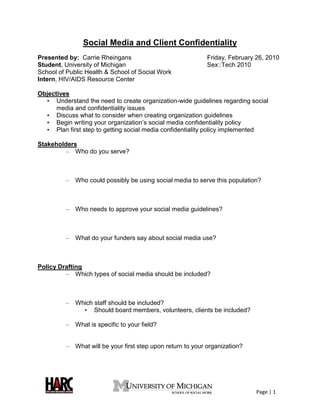Sex::Tech 2010 Handout
- 1. Social Media and Client Confidentiality Presented by: Carrie Rheingans Friday, February 26, 2010 Student, University of Michigan Sex::Tech 2010 School of Public Health & School of Social Work Intern, HIV/AIDS Resource Center Objectives ? Understand the need to create organization-wide guidelines regarding social media and confidentiality issues ? Discuss what to consider when creating organization guidelines ? Begin writing your organizationĪ»s social media confidentiality policy ? Plan first step to getting social media confidentiality policy implemented Stakeholders ©C Who do you serve? ©C Who could possibly be using social media to serve this population? ©C Who needs to approve your social media guidelines? ©C What do your funders say about social media use? Policy Drafting ©C Which types of social media should be included? ©C Which staff should be included? ? Should board members, volunteers, clients be included? ©C What is specific to your field? ©C What will be your first step upon return to your organization? Page | 1
- 2. Report Back ©C What was the easiest part? ©C What was the most difficult part? ©C What is your first step to start this process? NOTES **SAMPLE ©C HARCĪ»s current draft of social media policy ©C pending approval** Use of the Internet and Social Media Policy The use of the Internet and social media venues, including Facebook, MySpace, YouTube, Twitter and blogs, should not be conducted for personal use during work time. These are important resources, however, that can also help in conducting outreach for the organization and promoting HARC's services and events. When the purpose is work-related, then the use of these tools is acceptable during work time, but should also be approved and discussed with the employeeĪ»s supervisor. When using the Internet and other social media tools like those mentioned above, employees must follow the following guidelines: ? Employees must comply with all of the agencyĪ»s policies and agreements, including any on ethics, code of conduct, confidentiality and discrimination/harassment. ? Employees are personally and legally responsible for the content posted through social media venues. Employees can be disciplined by the organization for commentary, content, or images that are defamatory, pornographic, proprietary, harassing, libelous, or that can create a hostile work environment ? Unless given permission by the President/CEO, you are not authorized to speak on behalf of the organization, nor to represent that you do so. ? Never disclose any confidential or proprietary information concerning the agency or its customers or clients. ? Act professionally towards yourself, your coworkers and your agency. Do not post anything that will embarrass, insult, demean or damage the reputation of the agency, its services, customers or clients, or any of its employees Page | 2


